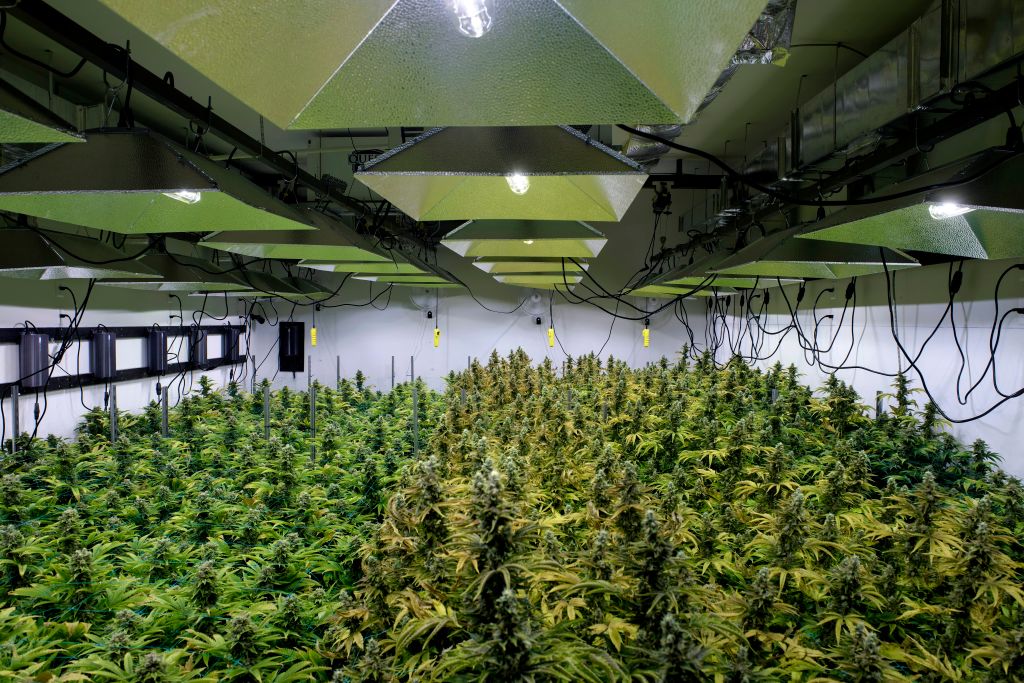The federal marijuana ban is contributing to climate change


A free daily email with the biggest news stories of the day – and the best features from TheWeek.com
You are now subscribed
Your newsletter sign-up was successful
Marijuana isn't actually very green, it turns out. Cannabis is the most energy-intensive crop in the U.S., Politico reports — though it needn't be. Grown in warehouses, marijuana production can require 2,000 watts of electricity per square meter, versus about 50 watts for lettuce, Lawrence Berkeley National Laboratory found. But marijuana grows great outdoors — it is called "weed" for a reason — in some areas of the country, especially Northern California and Southern Oregon.
"Because cannabis remains federally illegal, and the federal government regulates interstate commerce, none of the legal cannabis grown in Oregon or California can cross state lines," Politico's Natalie Fertig and Gavin Bade write. "Instead, each new state that legalizes recreational marijuana must also grow enough to meet consumer demand in that state. This would be like every state in America being required to grow all of the oranges consumed each year by its residents, rather than simply buying them from Florida."
Some states and cities require indoor cannabis operations to use energy-efficient LED grow lights or take other steps to mitigate carbon emissions, but "reducing the environmental impact of cannabis in state-siloed markets is not simple — or cheap," Politico says. Allowing the country to buy marijuana grown outdoors on the West Coast may not be a perfect solution either, though, since cannabis also takes water to grow, and water is a critically scarce commodity in Northern California and Southern Oregon.
The Week
Escape your echo chamber. Get the facts behind the news, plus analysis from multiple perspectives.

Sign up for The Week's Free Newsletters
From our morning news briefing to a weekly Good News Newsletter, get the best of The Week delivered directly to your inbox.
From our morning news briefing to a weekly Good News Newsletter, get the best of The Week delivered directly to your inbox.
A free daily email with the biggest news stories of the day – and the best features from TheWeek.com
Peter has worked as a news and culture writer and editor at The Week since the site's launch in 2008. He covers politics, world affairs, religion and cultural currents. His journalism career began as a copy editor at a financial newswire and has included editorial positions at The New York Times Magazine, Facts on File, and Oregon State University.
-
 Why are election experts taking Trump’s midterm threats seriously?
Why are election experts taking Trump’s midterm threats seriously?IN THE SPOTLIGHT As the president muses about polling place deployments and a centralized electoral system aimed at one-party control, lawmakers are taking this administration at its word
-
 ‘Restaurateurs have become millionaires’
‘Restaurateurs have become millionaires’Instant Opinion Opinion, comment and editorials of the day
-
 Earth is rapidly approaching a ‘hothouse’ trajectory of warming
Earth is rapidly approaching a ‘hothouse’ trajectory of warmingThe explainer It may become impossible to fix
-
 How climate change is affecting Christmas
How climate change is affecting ChristmasThe Explainer There may be a slim chance of future white Christmases
-
 Blue Origin launches Mars probes in NASA debut
Blue Origin launches Mars probes in NASA debutSpeed Read The New Glenn rocket is carrying small twin spacecraft toward Mars as part of NASA’s Escapade mission
-
 Why scientists are attempting nuclear fusion
Why scientists are attempting nuclear fusionThe Explainer Harnessing the reaction that powers the stars could offer a potentially unlimited source of carbon-free energy, and the race is hotting up
-
 Dinosaurs were thriving before asteroid, study finds
Dinosaurs were thriving before asteroid, study findsSpeed Read The dinosaurs would not have gone extinct if not for the asteroid
-
 Canyons under the Antarctic have deep impacts
Canyons under the Antarctic have deep impactsUnder the radar Submarine canyons could be affecting the climate more than previously thought
-
 SpaceX breaks Starship losing streak in 10th test
SpaceX breaks Starship losing streak in 10th testspeed read The Starship rocket's test flight was largely successful, deploying eight dummy satellites during its hour in space
-
 NASA is moving away from tracking climate change
NASA is moving away from tracking climate changeThe Explainer Climate missions could be going dark
-
 Rabbits with 'horns' sighted across Colorado
Rabbits with 'horns' sighted across Coloradospeed read These creatures are infected with the 'mostly harmless' Shope papilloma virus
